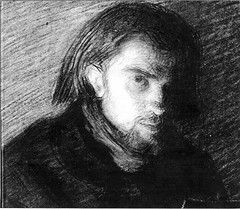Same, but not the same, Part II
Works that have come to hold a place in the standard repertory have been filtered by a large group of audiences and performers. The process has been painfully democratic in contrast to the process that ‘selected’ the canon.
Consider that Charles Ives might be the most discussed composer in American musical scholarship. Our discussion of Ives is central to our understanding of American classical music, but his useful experiments and mind-bending ideas were never put forward in a way that became palatable to a larger audience. He’s a bit of a niche composer who appears on a series like the ‘American Mavericks.’ His music does have a place in the SR, but it is nothing like that of Gershwin, for example.
Can we simply say then that Ives is more a part of the canon than the standard repertory? Well we could, but we should be aware that we are taking the whole concept of the canon and turning it on its head when we take a less performed, experimental eccentric and call him a central figure in the canon. Remember, the canon is all about agreed upon greatness. Its problems lie in the fact that it is hierarchical; the critiques of it are post-modern in nature.
This examination begets some interesting questions. What is the relationship between musical scholarship and the canon? Does the focus of historians on Ives elevate him as canonic? How does a composer’s importance to future generations impact upon this discussion?
And importantly, is the idea of a canon still of value? And, in what way? I know that this debate already has a scorched battlefield, but I’d still be interested in your views.
Consider that Charles Ives might be the most discussed composer in American musical scholarship. Our discussion of Ives is central to our understanding of American classical music, but his useful experiments and mind-bending ideas were never put forward in a way that became palatable to a larger audience. He’s a bit of a niche composer who appears on a series like the ‘American Mavericks.’ His music does have a place in the SR, but it is nothing like that of Gershwin, for example.
Can we simply say then that Ives is more a part of the canon than the standard repertory? Well we could, but we should be aware that we are taking the whole concept of the canon and turning it on its head when we take a less performed, experimental eccentric and call him a central figure in the canon. Remember, the canon is all about agreed upon greatness. Its problems lie in the fact that it is hierarchical; the critiques of it are post-modern in nature.
This examination begets some interesting questions. What is the relationship between musical scholarship and the canon? Does the focus of historians on Ives elevate him as canonic? How does a composer’s importance to future generations impact upon this discussion?
And importantly, is the idea of a canon still of value? And, in what way? I know that this debate already has a scorched battlefield, but I’d still be interested in your views.


3 Comments:
Your discussion of Ives almost turns the word ‘canon’ on its head. In ecclesiastical history, the canon was agreed upon in an effort to put down heresies. Church historians now delve back into these heresies in an effort to discover their place in the evolution of Christian thought. Wouldn’t composers like Ives and Cage be considered musical heretics of minimal interest to the casual concert-goer, but important to the historian/scholar?
The question for me is, can the casual concert-goer be inspired to appreciate these ‘heretics?’ How do we stretch the ears of the common audience (an experience some of us had in music school) so that it can appreciate these heretics or more generally (and more importantly perhaps) any new compositions.
about the first comment: NO we should not inspire the "casual concert-goer" to appreciate those works. they should just suffer them and sit in their seats waiting for the works they like. already we've learned to listen to beethoven, brahms, etc "casually" - please don't add any more casualities to the list.
Ideally, the canon would just be canon and our diet of classical music (as a genre) would consist of modern works, but given that most modern works don't hold up to the music of previous eras (when new music was all the rage, all the time) messing with all that we have will only invite more disgust from audiences alread disgusted enough. Hopefully Ives will only remain a niche.
Post a Comment
<< Home